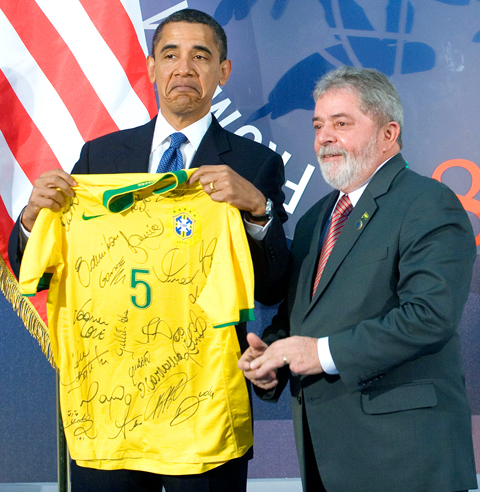The world’s biggest economies agreed to try to limit global warming to a 2ºC temperature hike yesterday as the major developing economies confronted the world’s richest at the G8 summit.
Brazil, China, India, Mexico and South Africa joined an expanded G8 summit on its second day, determined that their rich partners pay the lion’s share of the bill for dragging the world economy out of its dramatic slowdown.
The five developing countries agreed with the big eight — Britain, Canada, France, Germany, Italy, Japan, Russia and the US — that they would oppose protectionism and move more quickly toward a global trade deal.

PHOTO: AFP
But the emergent powers, formerly wary of shackling their growth potential through limiting their carbon emissions, also bowed to pressure from the G8 to agree climate change targets.
As late as last week, China and India stood opposed to ambitious reductions targets, arguing the rich world should lead the way in fighting climate change.
But according to a diplomat and a draft copy of a summit communique seen by AFP, the Major Economies Forum — the 16 countries that between them produce 80 percent of the world’s greenhouse gases — has come to a deal on a target.
The G8 countries, despite the reticence of Russia, had earlier agreed to cut their emissions by 80 percent by 2050.
Now the emerging economies appear to have accepted the principle of limiting the rise in the Earth’s average temperature to 2ºC above its pre-industrial revolution level.
Clear differences still remain, however.
Brazil, for example, dismissed the G8’s distant 80 percent emissions reduction target as “not credible” without an earlier interim stage, echoing the position of Russia, which has dismissed the goal.
“We can’t be satisfied with a single long-term objective without losing all credibility,” Brazilian Foreign Minister Luiz Alberto Figuereido Machado said.
“We need strong and deep reduction goals for 2020,” he said.
Aside from climate, the summit in L’Aquila focused on the world economic crisis, with the 14 major countries agreeing to resist domestic calls for protectionism.
“We will cooperate to ensure that the global economy resumes growth along a balanced, equitable and sustainable path for the benefit of all, especially the most vulnerable,” said the draft statement following the morning’s talks.
“We will resist protectionism and promote open markets for trade and investment,” added the draft statement, a copy of which was seen by AFP.
Leaders also vowed to conclude the Doha round of trade negotiations next year, again according to the draft accord.
“We ... are committed to seek an ambitious and balanced conclusion to the Doha Development Round in 2010, consistent with its mandate, building on the progress already made,” the joint draft statement said.
The so-called Doha round of trade liberalization talks were launched in the Qatari capital in late 2001 but have foundered ever since, despite repeated attempts to infuse new life into the negotiations.
Progress has been hampered by disputes between developed and developing nations on measures to ease restrictions on trade in agricultural and industrial products.

The CIA has a message for Chinese government officials worried about their place in Chinese President Xi Jinping’s (習近平) government: Come work with us. The agency released two Mandarin-language videos on social media on Thursday inviting disgruntled officials to contact the CIA. The recruitment videos posted on YouTube and X racked up more than 5 million views combined in their first day. The outreach comes as CIA Director John Ratcliffe has vowed to boost the agency’s use of intelligence from human sources and its focus on China, which has recently targeted US officials with its own espionage operations. The videos are “aimed at

STEADFAST FRIEND: The bills encourage increased Taiwan-US engagement and address China’s distortion of UN Resolution 2758 to isolate Taiwan internationally The Presidential Office yesterday thanked the US House of Representatives for unanimously passing two Taiwan-related bills highlighting its solid support for Taiwan’s democracy and global participation, and for deepening bilateral relations. One of the bills, the Taiwan Assurance Implementation Act, requires the US Department of State to periodically review its guidelines for engagement with Taiwan, and report to the US Congress on the guidelines and plans to lift self-imposed limitations on US-Taiwan engagement. The other bill is the Taiwan International Solidarity Act, which clarifies that UN Resolution 2758 does not address the issue of the representation of Taiwan or its people in

US Indo-Pacific Commander Admiral Samuel Paparo on Friday expressed concern over the rate at which China is diversifying its military exercises, the Financial Times (FT) reported on Saturday. “The rates of change on the depth and breadth of their exercises is the one non-linear effect that I’ve seen in the last year that wakes me up at night or keeps me up at night,” Paparo was quoted by FT as saying while attending the annual Sedona Forum at the McCain Institute in Arizona. Paparo also expressed concern over the speed with which China was expanding its military. While the US

SHIFT: Taiwan’s better-than-expected first-quarter GDP and signs of weakness in the US have driven global capital back to emerging markets, the central bank head said The central bank yesterday blamed market speculation for the steep rise in the local currency, and urged exporters and financial institutions to stay calm and stop panic sell-offs to avoid hurting their own profitability. The nation’s top monetary policymaker said that it would step in, if necessary, to maintain order and stability in the foreign exchange market. The remarks came as the NT dollar yesterday closed up NT$0.919 to NT$30.145 against the US dollar in Taipei trading, after rising as high as NT$29.59 in intraday trading. The local currency has surged 5.85 percent against the greenback over the past two sessions, central